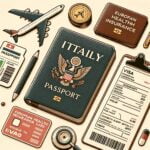Are you planning a trip to Italy? Whether it’s for a dream vacation, family visit, or business trip, it’s essential to have the right documents in order. From passports and visas to travel insurance and COVID-19 requirements, this comprehensive guide will walk you through everything you need to know about preparing for your travels to Italy.
Italy is known for its rich history, stunning architecture, delicious cuisine, and beautiful landscapes. The prospect of visiting this enchanting country is undoubtedly exciting. However, before you can immerse yourself in all that Italy has to offer, it’s crucial to ensure that you have all the necessary travel documents in place. Without these essential items, your trip could quickly turn into a bureaucratic nightmare.
In this article, we’ll cover the passport and visa requirements for traveling to Italy, the importance of travel insurance, any current COVID-19 requirements you should be aware of when visiting the country, as well as information on immigration and customs forms. We’ll also provide a handy checklist of all the documents needed for travel to Italy and valuable tips on obtaining them.
So sit back, relax, and let us guide you through the process of preparing for your Italian adventure.
Passport Requirements
Traveling to Italy is an exciting adventure, but it’s important to ensure that you have the right travel documents in order to have a smooth and hassle-free trip. One of the most essential documents for traveling to Italy is a valid passport.
Passport Requirements for Traveling to Italy
For travelers from many countries, including the United States, a passport that is valid for at least three months beyond the planned date of departure from Italy is required for entry. It’s crucial to check your passport’s expiration date well in advance of your trip and renew it if necessary.
Additionally, if you don’t currently have a passport or need to obtain a new one, it’s recommended to apply as soon as possible before your planned travel dates.
Tips for Renewing or Obtaining a New Passport
When renewing your passport or applying for a new one, be sure to allow plenty of time for processing. Routine service can take several weeks, so consider expedited processing if you’re short on time. The U.S. Department of State provides detailed information about passport application and renewal processes on their official website, including forms, fees, and processing times. Be sure to follow all instructions carefully and submit all required documentation to avoid delays with your passport application.
Visa Requirements
Types of Visas
Travelers to Italy need to understand the different types of visas available. The most common type for tourism purposes is the Schengen visa, which allows travelers to visit other countries in the Schengen Area as well. There are also specific visas for work, study, or family reunification. It’s important to carefully determine which type of visa best suits your travel needs and apply accordingly.
Application Process
The application process for an Italian visa can vary based on the traveler’s nationality and purpose of visit. Generally, it involves filling out an application form, providing necessary documentation such as a valid passport, financial statements, and travel itinerary, and attending a visa interview at the Italian consulate or embassy. It’s crucial to start the visa application process well in advance of your planned trip to allow for any unexpected delays.
Tips for Visa Approval
To increase your chances of having your Italian visa approved, it’s essential to thoroughly prepare your application and provide all required documentation. Ensuring that you have a clear travel itinerary with proof of accommodation and return flight bookings is vital.
Additionally, showing proof of sufficient funds to cover your stay can demonstrate that you won’t be relying on public assistance during your visit. It’s also crucial to maintain transparency throughout the application process and honestly answer any questions posed during the interview stage.
Travel Insurance
Travel insurance is an important aspect of preparing for a trip to Italy. While no one likes to think about potential mishaps during their travels, having the right insurance can provide peace of mind and financial protection in case of unforeseen circumstances. When choosing a travel insurance plan for your trip to Italy, it’s essential to carefully consider the coverage options and choose a plan that best suits your needs.
One important aspect of travel insurance for Italy is medical coverage. In the event of a medical emergency or injury during your trip, having adequate coverage can help mitigate the costs of medical treatment. Additionally, be sure to check if the policy includes coverage for emergency medical evacuation, which can be crucial in more serious situations.
Another consideration when selecting travel insurance for Italy is trip cancellation and interruption coverage. This type of coverage can provide reimbursement for prepaid, non-refundable expenses in case your trip is canceled or cut short due to covered reasons such as illness, injury, or other unforeseen events. Be sure to review the specific terms and conditions of the policy to understand what circumstances are covered.
Before purchasing travel insurance for your trip to Italy, it’s also important to review any existing coverage you may have through other sources such as credit cards or membership programs. Some credit cards offer certain types of travel insurance as a benefit, so it’s wise to compare these offerings with standalone policies and determine the best option for your specific travel needs.
Ultimately, having comprehensive travel insurance can provide valuable protection and peace of mind during your journey to Italy.
COVID-19 Requirements
Italy, like many countries, has specific COVID-19 requirements for travelers entering the country. It is important for visitors to stay updated on any current regulations and guidelines to ensure a smooth and hassle-free trip. Here are some key points to consider regarding COVID-19 requirements for traveling to Italy:
- Testing Requirements: Travelers may be required to provide proof of a negative COVID-19 test result before entering Italy. It is essential to research the specific testing requirements and timelines, as they can vary based on factors such as vaccination status and the traveler’s country of origin.
- Vaccination Requirements: Italy may have specific guidelines for vaccinated travelers, including accepted vaccines and documentation needed. Travelers should be prepared to show proof of vaccination when entering the country.
- Quarantine Protocols: Depending on current conditions and travel history, visitors to Italy may be subject to quarantine requirements. It is crucial to understand these protocols and have a plan in place in case quarantine becomes necessary.
As COVID-19 regulations continue to evolve, it is important for travelers to regularly check for updates from reliable sources such as government health agencies and official travel advisories. By staying informed about COVID-19 requirements, travelers can better prepare for their trip and avoid any unexpected complications or delays.
When planning a trip to Italy, it is also wise to consider how COVID-19 requirements may impact other aspects of travel, such as accommodations, transportation, and activities. Being proactive in understanding these regulations will contribute to a safer and more enjoyable experience while visiting this captivating destination.
Stay informed about current COVID-19 requirements before embarking on your journey, as these measures are subject to change. When armed with up-to-date information on testing, vaccination, quarantine protocols, and any other related guidelines, travelers can reduce stress and make the most of their time exploring all that Italy has to offer.
Immigration and Customs Forms
Italy, like many other countries, has specific immigration and customs forms that travelers need to be aware of when entering the country. One of the most important forms to have is the Schengen visa application form if you are a citizen of a country that requires a visa to enter Italy.
This form can typically be downloaded from the website of the Italian consulate or embassy in your home country. It’s important to fill out the form accurately and truthfully, as any discrepancies could lead to delays or denial of entry into Italy.
Another important document is the Passenger Locator Form (PLF), which has become especially crucial during the COVID-19 pandemic. All travelers entering Italy are required to fill out this form, providing information about their travel itinerary and contact details while in Italy. This form is typically submitted online before your departure, and you may be required to show proof of completion upon arrival in Italy.
In addition to these specific immigration and customs forms, it’s also important to have all general travel documents readily accessible when going through customs at an Italian airport or border checkpoint. This includes your passport, boarding passes, and any documentation related to accommodations or transportation while in Italy. By being well-prepared with all necessary forms and documents, you can help ensure a smooth entry into Italy and start enjoying your travels without unnecessary complications.
| Document | Description |
|---|---|
| Schengen Visa Application Form | Required for citizens of certain countries for entry into Italy |
| Passenger Locator Form (PLF) | Mandatory for all travelers entering Italy; provides travel details and contact information |
| General travel documents (passport, boarding passes, etc.) | Necessary for all travelers going through Italian immigration and customs checks |
Documents Checklist
When traveling to Italy, it is crucial to have all the necessary documents in order to ensure a smooth and hassle-free trip. A comprehensive checklist of documents is essential for travelers to avoid any potential issues at the airport or upon arrival in Italy. Here is a checklist of the essential documents needed for travel to Italy:
- Passport: Ensure that your passport is valid for at least six months beyond your planned date of departure from Italy. If your passport is expired or close to expiration, make sure to renew it well in advance of your travel dates.
- Visa: Depending on your nationality, you may need a visa to enter Italy. Check the Italian embassy or consulate website in your country to determine if you require a visa and the specific type of visa you need for your trip.
- Travel Insurance: While not mandatory, having travel insurance for your trip to Italy provides financial protection in case of unforeseen circumstances, such as trip cancellation, medical emergencies, or lost luggage.
- COVID-19 Documents: Stay informed about the current COVID-19 requirements for travelers to Italy, including any testing or vaccination certificates that may be necessary for entry.
- Immigration and Customs Forms: Familiarize yourself with any required immigration and customs forms for entry into Italy and ensure that they are filled out accurately and submitted as required.
It’s important to organize all these documents in a secure folder or travel wallet and keep them easily accessible during your journey. Double-checking that you have all the necessary documents before leaving for the airport will save you from potential stress and complications during your travels.
Important Contacts and Resources
When traveling to Italy, it is crucial to have the right documents in order to ensure a smooth and hassle-free trip. Here are some important contacts and resources that can help travelers obtain the necessary documents for their trip:
- Italian Embassy or Consulate: Contact the nearest Italian embassy or consulate to inquire about specific visa requirements and application processes. They can provide valuable information on visa types, processing times, and required documentation.
- U.S. Department of State: The U.S. Department of State’s website provides essential travel information for Americans visiting Italy, including passport and visa requirements, safety alerts, and emergency assistance for U.S. citizens abroad.
- National Passport Information Center: For passport-related inquiries, travelers can contact the National Passport Information Center for assistance with passport applications, renewals, expedited processing, and general passport information.
- Travel Insurance Providers: Research different travel insurance providers to find a plan that best suits your needs. Consider factors such as coverage for medical expenses, trip cancellations, emergency evacuation, and COVID-19 related benefits.
- Centers for Disease Control and Prevention (CDC): Stay updated on the latest COVID-19 requirements and guidelines for travel to Italy by referring to the CDC’s travel health notices and recommendations. This includes information on testing requirements, vaccination status, and health precautions.
By utilizing these important contacts and resources, travelers can ensure that they have all the necessary documents in hand before embarking on their journey to Italy. Thoroughly researching and obtaining the correct documentation will help prevent any potential travel delays or complications during your trip. Always double-check the validity of your documents well in advance of your departure date to avoid any last-minute issues.
Conclusion
In conclusion, having the right documents for travel to Italy is crucial for a smooth and enjoyable trip. From passports to visas, travel insurance, COVID-19 requirements, and immigration forms, being prepared with the correct paperwork can make all the difference in your travel experience. It’s essential to thoroughly research and understand the specific document requirements for Italy and to take proactive steps to ensure you have everything in order before departing for your trip.
We cannot overemphasize how important it is to double-check all necessary documents before traveling. Missing or incomplete paperwork can lead to unnecessary stress, delays, or even denied entry into Italy. By following the guidelines outlined in this article and using the resources provided, travelers can feel confident that they are well-prepared with all the essential documents needed for their journey.
Ultimately, remember that thoroughly preparing and organizing your travel documents will allow you to focus on enjoying every moment of your time in Italy instead of worrying about bureaucratic hurdles. With proper planning and attention to detail, you can set yourself up for a successful and hassle-free travel experience in this beautiful European destination.
Frequently Asked Questions
What travel documents do you need to go to Italy?
When traveling to Italy, you will need a valid passport that is not set to expire within six months of your arrival date. Depending on your nationality, you may also need a visa to enter Italy for tourism or business purposes.
It’s important to check the specific requirements for your country and obtain the necessary travel documents before your trip.
What proof of funds do I need to travel to Italy?
When traveling to Italy, it’s important to have proof of sufficient funds to cover your stay. This can include bank statements, credit card statements, or any other evidence of financial means that show you can support yourself during your visit.
The amount required may vary depending on the length of your stay and your accommodation arrangements, so it’s best to check the specific requirements for proof of funds when planning your trip.
What documents are required for Italy tourist visa?
The documents required for an Italy tourist visa typically include a completed visa application form, a valid passport, passport-sized photos, proof of travel arrangements and accommodation in Italy, travel insurance, flight itinerary, and proof of sufficient funds to cover your stay. Additional documents may be required based on individual circumstances and the specific requirements of the Italian consulate or embassy processing the visa application.
It’s important to thoroughly review the visa application requirements and ensure all necessary documents are submitted.

I’m a passionate traveler, writer, and Italophile. My fascination with Italy’s history, art, and culture has led me on countless adventures across the Italian landscape. Through “I Live Italy,” I share my love for this extraordinary country and aims to inspire others to explore its boundless beauty.




